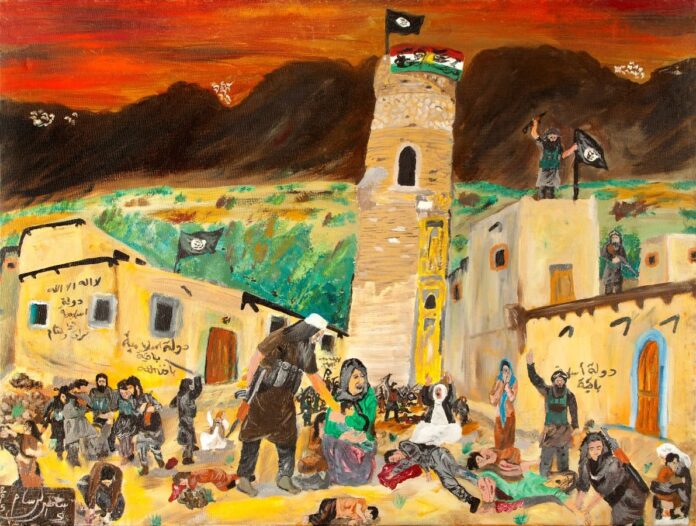RIYADH: A Daesh soldier dressed in black lifts a long stick with what appears to be orange fabric over the heads of Yazidi women and children in a cage.
The women and children grasp the bars before them; some have their eyes shut while others keep them open in anguish, sadness, and distress.
This is just one of the artworks that forms part of the Yazidi Cultural Archives by genocide survivors that has been published by the UN on Google’s arts and culture platform.
‘Fleeing on truck,’ by Zmnanko Ismael, taken in Sinjar, Iraq in 2018. (Yazidi Cultural Archives)
The archives, which present four online exhibitions in English and Arabic, were produced over 12 months by 16 Yazidi women working in collaboration with Yazda, a community-led multinational that protects and encourages Yazidis and other religious and ethnic minority communities.
They were launched at the Yazda headquarters in Duhok, Iraq, and the Arab World Institute in Paris.
Yazda President Haider Elias said: “Our culture is our identity; preserving it is crucial to our hearts and souls as a community.
“After the genocide of 2014, the cultural genocide started and is ongoing as our temples and houses of worship have been destroyed.
“This digital archive created by the survivors serves as moral support for those of us who have been traumatized and experienced a deep panic of losing our roots and culture.”
The launch of the Yazidi Cultural Archives was marked at a meeting in Duhok, Iraq, on October 20, 2022, with Amsha Ali Ravo and Malaeen Luqman Khalaf, two of the project participants who created the archives, and representatives of Yazda and Community Jameel. From left to right: Nathaniel Daudrich, creative and digital lead, Community Jameel; George Richards, director, Community Jameel; Amsha Ali Ravo; Henrieta Mr?zov?, field coordinator, Sinjar, Yazda; Haider Elias, president, Yazda; Malaeen Luqman Khalaf; Saman Qaydar Hussein, Yazda. (Supplied)
According to the International Organization for Migration, of more than half a million Yazidis in Iraq before 2014, 360,000 were displaced by Daesh, with more than 200,000 still living in internally displaced camps.
The arts have often been used to facilitate methods of cross-cultural understanding, communication, expression, and education. In recent decades they are increasingly being used to encourage healing from war, genocide, and its aftermath.
‘Burning Women,’ by Hanna Hassan. (Yazidi Cultural Archives)
George Richards, director of Community Jameel, which aims to tackle some of the world’s most urgent challenges, said: “The Yazidi women who created these archives are seeking to cope with, and heal from traumatic events and to affirm their identity by documenting their culture.
“This project seeks to leverage the known power of the arts and participatory archiving to support healing and, in evaluating the effectiveness of the intervention, also seeks to advance the evidence base for the positive impact that this approach can have — potentially to inform the design and delivery of similar interventions in other contexts around the world.”
The project supported 16 survivors from camps in Qadia, Khanke, Mamrashan, Kabartu, Sharia, and Chameshko in Duhok Province, and will now be used by Yazda in much wider support programs.
An evaluation of the archives’ impact on the psychological well-being of participants is being supported by New York University’s Arts and Health initiative and the World Health Organization.
Christopher Bailey, arts and health lead for the WHO, said: “With a growing body of evidence that participating in and enjoying the arts can help people cope, exercise their agency, develop their abilities, build community, and bring moments of joy, our vision is to lead a healing arts revolution that improves the physical, mental, and social well-being of millions of people worldwide.”
The Yazidi Cultural Archives were created in partnership with Community Jameel, Culturunners, the Office of the UN secretary-general’s envoy on technology, and Nobody’s Listening, a platform encouraging individuals and governments to provide financial support to women and children victimized by Daesh.

